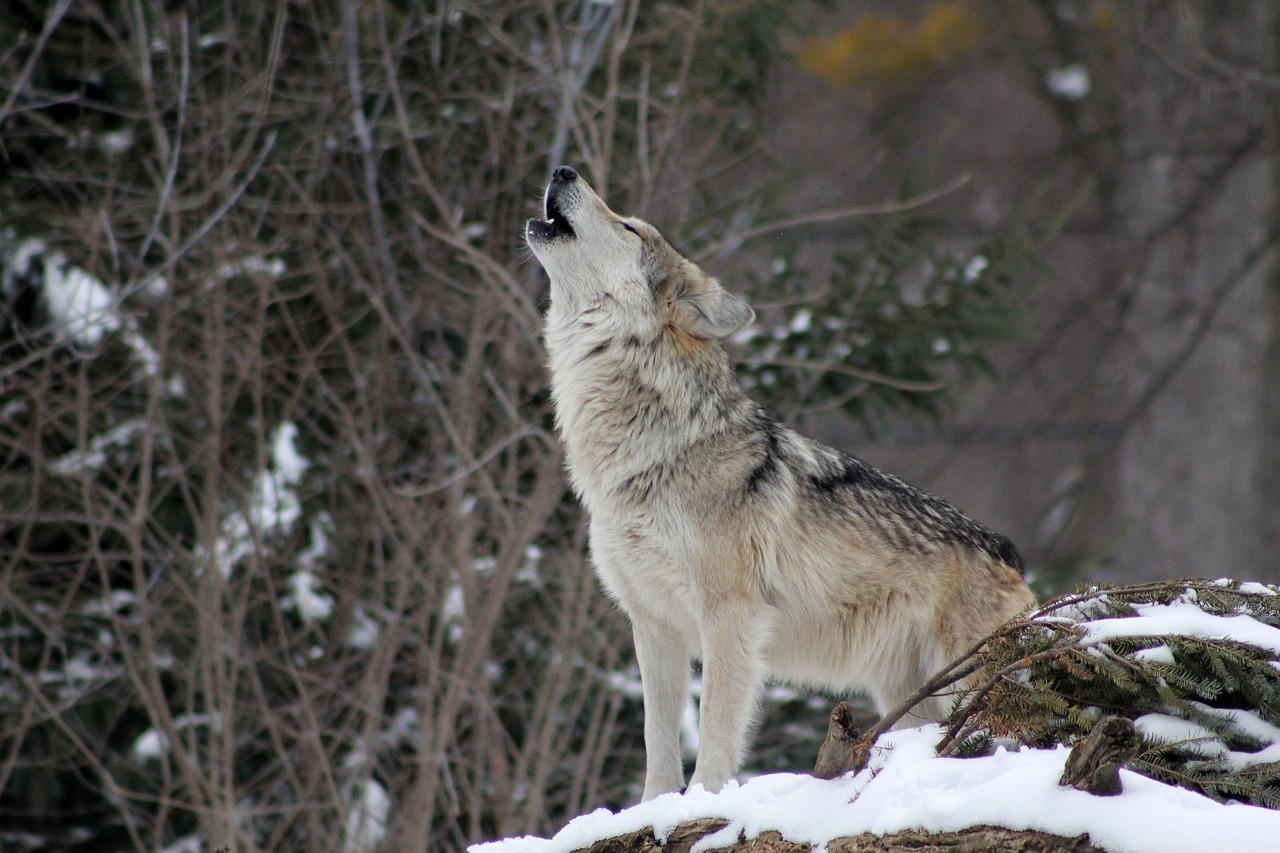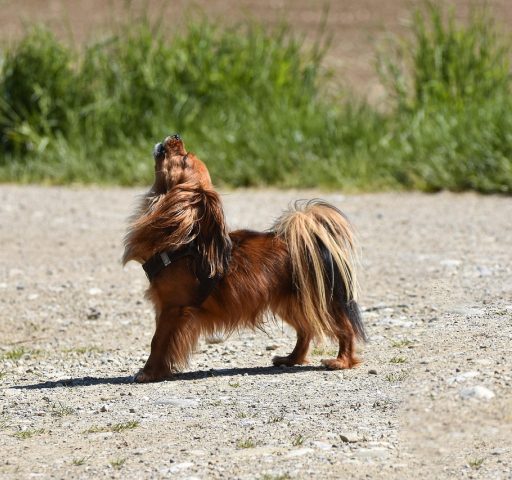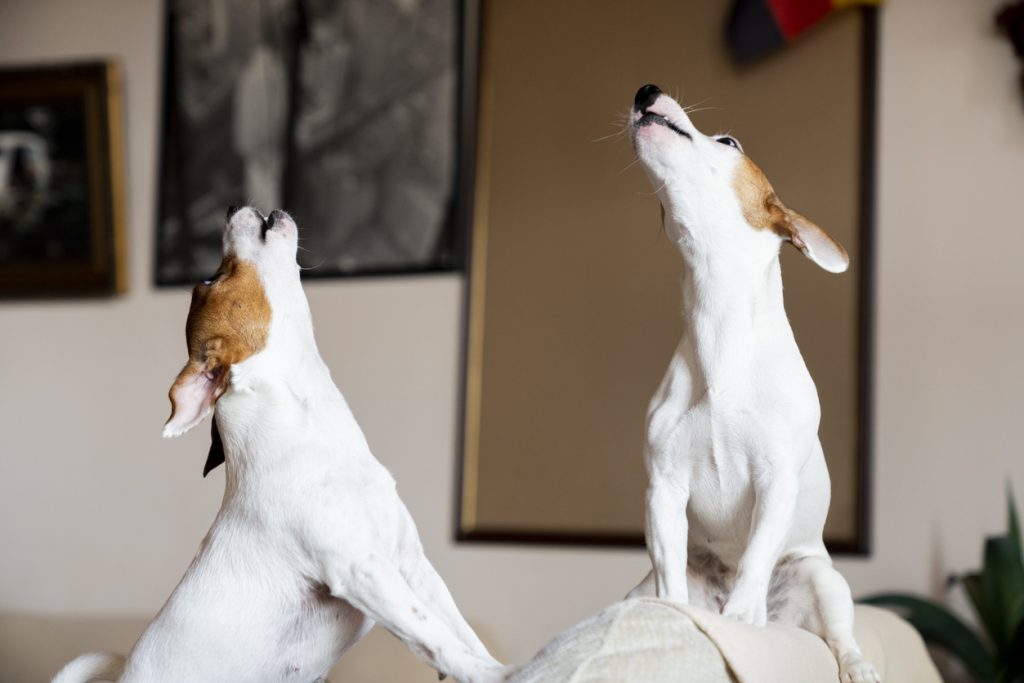Check out this interesting post from Helen Merino—dog handler, trainer, and returning guest blogger. This time, Helen delves into the origin of and the many possible reasons for our dogs to make their presence known—loudly!
Thank you, Helen, for letting us hear from you again.

PS
Interested in being a guest-blogger? Contact me.
Why Do Dogs Howl?
The Mysterious and Funny Instinct Explained
OMG, That Noise!
A car alarm goes off and your cockapoo bends his head back. You know what’s coming. He does it every time. “Owwwwooooooooooo!” Suddenly, your fluffy little couch cuddler is a wild thing.
A howling dog is a reminder that we have an animal on our sofa. It’s cute. It’s annoying. And it’s…a little mysterious.
So why do domestic dogs howl? Is it a call to their wolf ancestors? A way to express themselves? Or are they simply saying, “Someone turn off that siren!”
Understanding the reasons for that sound—and yes, there are many reasons for it—can help you respond to your dog’s needs. It might even strengthen your bond.
Let’s explore the instinct behind why domestic dogs howl. We’ll look at the different meanings behind the behavior. We’ll also talk about when to get your vet involved.
Get ready to unlock the mystery of your dog’s inner wild thing!
The Wolf Connection
Howling is an instinctive habit of dogs. They inherited the knack from their ancestor, the wolf.

When a wolf howls, it’s not just noise. The howl can carry for miles in the wild, communicating over long distances. Every howl from a wolf is a purposeful message to other animals.
Howling allows pack members to keep track of each other. That distinctive call helps them reunite if they become separated. The howl can say to others in the pack, “I’m here. Meet me here.”
Howling is also a way to claim territory, warning non-pack members to stay clear of the pack’s land.
Wolves might also howl together to signal the start of a hunt or to celebrate a successful kill, reinforcing pack unity.
I’m not saying your dog howls to announce territorial claims or rally your family to hunt. Dogs howling nowadays is an adaptation of that old wolfy habit. Evolution has refitted this ancient instinct to fit the current lives of domesticated dogs.
Which Domesticated Dog Breeds Howl?

Howling behavior shows up a lot in breeds with a working ancestry, such as Huskies and Malamutes. Howling has helped these dogs communicate with each other and their humans while working together in challenging environments.
But let’s be clear—howling isn’t limited to these breeds.
Plenty of dogs without a strong working background also howl. These dogs howl as a way to reach out to their “pack.” In this case, that means you.
Sometimes, a howl is a call to announce stress, isolation, or the desire for your attention and comfort. Howling might be your dog’s way of alerting you to something new in the environment, even if it’s as small as an unexpected sound.
In essence, the spectacle of a domestic dog howling isn’t just some ancient instinct. Today, dogs bring this primal communication into our modern lives as an expression of their bond with us.
Dogs Howl to Express Emotions
Often, dogs howl just to say, “I’m feeling some big feels here!” From loneliness to excitement, each howl offers a clue about what your dog is feeling and can carry a unique message.
A dog’s howl can mean:
- Loneliness: seeking connection or companionship, especially when left alone
- Anxiety: often related to separation, it could indicate distress or just general insecurity
- Excitement: being triggered by a high-energy event or a new experience
- Alertness: responding to unusual sounds or sights, like sirens or strangers
- Attention-seeking: trying to draw focus from people or other animals
- Stress or discomfort: reflecting unease with an unfamiliar situation or environment
- Contentment: relaxing or bonding, especially in a group setting
This may be the cutest version of dog howling…
Common Triggers
Noises, especially high-pitched sounds, are one of the most dependable triggers. Doorbells, sirens (including on television!), or even someone playing a musical instrument can set off a hearty howl. And a lot of the time, dogs howl in response to any kind of noise. That’s it. Just some random noise, inside or outside.
Another big trigger is, well…other dogs howling. These pitches resemble the distant calls that once alerted their ancestors in the wild. So, your dog could feel an urge to “join in.” Or sometimes, pooches who hear the call of other animals in the neighborhood could just be answering back or staking out their territory.
When Your Dog Needs a Vet
A dog’s howl can sometimes signal discomfort, pain, underlying medical issues, or even dental problems.
Senior dogs are especially prone to howling due to cognitive decline or confusion (similar to dementia in people). This can lead to disorientation and anxiety, causing dogs to vocalize more frequently as a way to cope.
It’s important to pay attention when the howling is out of character.
A sudden increase in howling, inexplicable triggers, or changes in vocalization could be an early signal of physical or mental distress. A vet visit can help identify and manage any health issues that may be causing this change in your pup’s behavior.
Just Howl Along With ‘Em
I admit that when dogs howl, I find it cute. But I’ve never lived with a dog that howled regularly. So, if you’re annoyed, I get it. But maybe just step back for a minute and try to appreciate it.
One way to think of it is when a domesticated dog howls, we’re getting a peek through the window into their ancestry, their evolution. Sort of a moment with your dog’s wild nature.


And remember, that howl carries an implied compliment. Your dog is saying, “You’re my pack. I want to talk with you!” So instead of being annoyed, feel honored. You might even want to get down on all fours and howl along.
You can connect with Helen on her website.
Resources
AKC: Why Do Dogs Howl, by Stephanie Gibeault, MSc, CPDT
Mental Floss: Why Do Dogs Howl at Sirens, by Jake Rossen
Modern Dog Magazine: Beware the Howling Dog, by Stanley Coren
